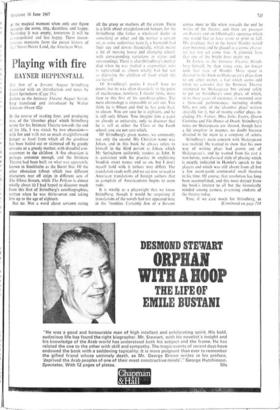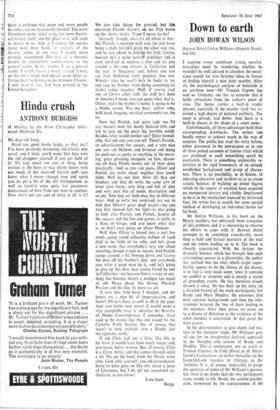Playing with fire
RAYNER IIEPPENSTALL
The Son of a Servant August Strindberg translated with an ,introduction and notes by Evert Sprinchorn (Cape 35s) Letters to the Intimate Theatre August Strind- berg translated and introduced by Walter Johnson (Owen 42s) In the course of reading four, and producing two, of the 'chamber plays' which Strindberg wrote for his Intimate Theatre towards the end of his life, I was struck by two obsessions— with fire and with not so much straightforward hunger as food from which all the goodness has been boiled out or skimmed off by greedy servants or a greedy mother, with dreadful con- sequences to the children. A fire obsession is perhaps common enough, and the Intimate Theatre had been built on what was apparently known in Stockholm as the Burnt Site. Of the other obsession (about which two different characters tear off strips in different acts of The Ghost Sonata, while The Pelican is almost wholly about it) I had hoped to discover much from this first of Strindberg's autobiographies, written when he was thirty-seven and taking him up to the age of eighteen.
But no. Not a word about servants eating all the gravy or mothers all the cream. There is a little about straightforward hunger, for the Strindbergs (die father a wholesale dealer in something or other and the mother a servant or, as some authorities have it, a barmaid) had their ups and downs financially, which meant a lot of moving house and changing school, with corresponding variations in status and surroundings. There is also (Strindberg's mother died when he was twelve) a stepmother, ‘‘ho is represented as almost wholly bad but not as depriving the children of food which she ale herself.
Of Strindberg's genius I myself have no doubt, but he was often disorderly to the point of incoherence, nowhere, I should think, more than in this first of his autobiographies. The mere chronology is impossible to sort out. You think he is fifteen and find he has gone back to eleven. You are sure he is eighteen, and he is still only fifteen. You imagine him a cadet or already at university, only to discover that he is still at either the Clara or the Jacob school, you are not sure which.
Of Strindberg's given names, we commonly use only the second. His Christian name was Johan, and in this book he always refers to himself in the third person as Johan, which Mr Sprinchorn uniformly renders as John. It is consistent with his practice in anglicising Swedish street names and so on, but I don't myself hold with it (others may differ). The translation reads well, and we are now so used to American translations of foreign authors that to complain of Americanisms begins to seem rude.
It is wholly as a playwright that we know Strindberg, though it would be surprising if translations of the novels had not appeared here in the 'twenties. Certainly Son of a Servant comes most to life when towards the end he writes of the theatre, and there are passages on Hamlet and on Offenbach's operettas which one would like to have room to print in full. His prophecy that in the future Hamlet would stop mooning and be played as a comic charac- ter has not yet come true. A gimmick here that one of the bright boys might try.
In Letters to the Intimate Theatre, Strind- berg himself, by then rising sixty. no longer Look that view of H:tmlet. More space is devoted in this book to Shakespeare's plays than to any other matter, a fact which seems odd when we consider that the Intimate Theatre attempted no Shakespeare but existed solely to put on Strindberg's own plays, of which, in its three years of existence. it mounted over a thousand performances, including double bills, not only of the 'chamber plays' written specially for it. but of twenty earlier plays, in- cluding The Father, Miss Julie, Easter, Queen Christina and The Dance of Death. Strindberg's notes on Shakespeare are shrewd, though here a bit simpliste in manner, no doubt because directed in the main to a company of actors.
Strindberg's main concern with Shakespeare was twofold. He wanted to show that his own way of writing plays had grown out of Shakespeare's, and he wanted from his cast a non-heroic, non-classical style of playing which is exactly indicated in Hamlet's speech to the players and which was still absent from all but a few avant-garde continental small theatres in his time. Of course, that revolution has long been accomplished, and this must detract from the book's interest to all but the historically minded among earnest, practising students of the theatre today.
True, if we care much for Strindberg, as [Continued on page 714
there is evidence that more and more people 40 today, we are historically minded. The more Strindberg seems 'alive' to us, the more theatri- cal history itself, and his place in it, will seem to matter to us. And so I cannot but recomi mend both these books to students of the theatre, while, of the two, I would more strongly recommend The Son of a Servant, despite its intermittent confusedness, to the general reader. In this matter, I am a general reader. I simply found it easier to read. I may, on the other hand, find myself more often re- ferring back to Letters to the Intimate Theatre. I only wish it, too, had been printed in the United Kingdom.



































 Previous page
Previous page